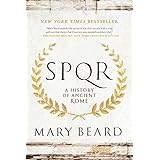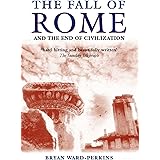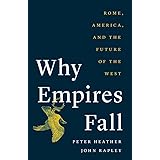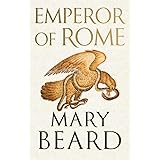Buy new:
-42% $21.95$21.95
Save with Used - Good
$12.42$12.42
Ships from: Amazon Sold by: Corax Books

Download the free Kindle app and start reading Kindle books instantly on your smartphone, tablet, or computer - no Kindle device required.
Read instantly on your browser with Kindle for Web.
Using your mobile phone camera - scan the code below and download the Kindle app.

OK
 Audible sample Sample
Audible sample Sample 


Empires and Barbarians: The Fall of Rome and the Birth of Europe 1st Edition
There is a newer edition of this item:
Purchase options and add-ons
The book's vivid narrative begins at the time of Christ, when the Mediterranean circle, newly united under the Romans, hosted a politically sophisticated, economically advanced, and culturally developed civilization--one with philosophy, banking, professional armies, literature, stunning architecture, even garbage collection. The rest of Europe, meanwhile, was home to subsistence farmers living in small groups, dominated largely by Germanic speakers. Although having some iron tools and weapons, these mostly illiterate peoples worked mainly in wood and never built in stone. The farther east one went, the simpler it became: fewer iron tools and ever less productive economies. And yet ten centuries later, from the Atlantic to the Urals, the European world had turned. Slavic speakers had largely superseded Germanic speakers in central and Eastern Europe, literacy was growing, Christianity had spread, and most fundamentally, Mediterranean supremacy was broken.
Bringing the whole of first millennium European history together, and challenging current arguments that migration played but a tiny role in this unfolding narrative, Empires and Barbarians views the destruction of the ancient world order in light of modern migration and globalization patterns.
- ISBN-100199735603
- ISBN-13978-0199735600
- Edition1st
- PublisherOxford University Press
- Publication dateMarch 4, 2010
- LanguageEnglish
- Dimensions9.3 x 1.8 x 6.4 inches
- Print length752 pages
Frequently bought together

Similar items that may deliver to you quickly
Editorial Reviews
From Booklist
Review
"Most immediately impressive is Heather's easy command of detail. A jaunty, man of the people prose style masks a sure and scholarly grip on the history and archaeology of the first millenniem A.D. One of Heather's most attractive strengths is his eye for comparision. He neatly sets his thinking about first-millennium migration against modern experiences of the lure of the New World or the desperate flight of Kosovar or Rwandan refugees."--Christopher Kelly, Literary Review
"Peter Heather's book is an important contribution to the field--the first up-to-date book that compares the Germanic and the Slav migrations of the early middle ages. It is lucid and it has a complex argument, but it is grippingly written."--Chris Wickham, author of The Inheritance of Rome: Illuminating the Dark Ages, 400-1000
"This is a major work on the political and ethnic shaping of Europe during the first millennium A.D., embracing not just the Germanic and sub-Roman peoples, but also the Slavs and the Vikings. No one interested in the formation of European states and identities will be able to ignore this book."--Bryan Ward-Perkins, author of The Fall of Rome and the End of Civilization
"Heather manages to robustly balance the need for both breadth and depth. A superior piece of scholarship."-DiscoverMagazine.com
"While ambitious in scope, one of the delightful aspects of this hefty volume is its eminent readability. Heather's writing is often playful in style. This conversational and sometimes humorous tone, combined with a knack for explaining complex ideas clearly, belies the complexity of his argument and the sheer amount of information conveyed." -Laura Wangerin, World History Bulletin
"In addition to offering a new way of looking at the broad trends of European history, Heather also makes a major contribution to a long-standing debate about the role of migration in the first millennium…[Empire and Barbarians'] range, its highly important themes, and the boldness and clarity of its writing should stimulate argument and advance debate for years to come." -Edward James, American Historical Review
"Empires and Barbarians is a significant accomplishment and a welcome gateway for the curious as well as the deeply informed." --HNN.com
Book Description
About the Author
Product details
- Publisher : Oxford University Press; 1st edition (March 4, 2010)
- Language : English
- Hardcover : 752 pages
- ISBN-10 : 0199735603
- ISBN-13 : 978-0199735600
- Item Weight : 2.76 pounds
- Dimensions : 9.3 x 1.8 x 6.4 inches
- Best Sellers Rank: #1,014,251 in Books (See Top 100 in Books)
- #1,708 in Ancient Roman History (Books)
- #27,156 in World History (Books)
- #36,564 in Unknown
- Customer Reviews:
About the author

Discover more of the author’s books, see similar authors, read author blogs and more
Customer reviews
Customer Reviews, including Product Star Ratings help customers to learn more about the product and decide whether it is the right product for them.
To calculate the overall star rating and percentage breakdown by star, we don’t use a simple average. Instead, our system considers things like how recent a review is and if the reviewer bought the item on Amazon. It also analyzed reviews to verify trustworthiness.
Learn more how customers reviews work on Amazon-
Top reviews
Top reviews from the United States
There was a problem filtering reviews right now. Please try again later.
In "The Fall of the Roman Empire," Heather presented what was to me a new and original explanation for the dissolution of the empire, one of history's great questions. Heather believes that technological developments and wealth leached out from the Roman borders to allow the Germanic tribes living in northern and eastern Europe to develop a greater level of material and political sophistication and more efficient agricultural methods. This increase in sophistication led to a population rise among the Germanic tribes, and in turn an increase in political and military heft, which allowed the tribes to encroach on an overextended Roman empire, teetering from civil war and war on its Persian front. In a fascinating passage in "Empires & Barbarians," Heather speculates that the Hunnic invasion form the steppes led by Attila was a crucial precipitating cause in the collapse of the empire, as the increasingly powerful Germanic tribes would probably have done no more than annex certain Roman provinces, letting the Empire continue on. Heather supports his theory principally through a review of recent archaeological research from Germany and eastern Europe with less emphasis placed on Roman historical writings.
"Empires & Barbarians" advances Heather's case by describing current thinking of human migrations, examines issues and controversies currently preoccupying ancient & medieval scholars, making in-depth analysis of events such as the Anglo-Saxon takeover of Britain and the expansion of the Frankish empire in the 5th & 6th centuries, and careful reviews of the archaeological digs undertaken by Warsaw Pact scientists to unravel the mysteries of the Slavic ascendance. The analysis is penetrating, subtle and not pedantic.
A measure of the excellence of this book can be seen in the account of middle medieval Byzantium. I have read quite a few books about Byzantine history yet nothing has clarified for me the shape and crucial developments in Byzantium's empire after the fall of the west like the few pages Heather devotes to it. Heather summarizes the brutal wars Byzantium successfully engaged in during the earlier part of the 7th century, with a dramatic and draining success on both the European and Persian fronts "turning to ashes" as the Islamic wave swept across the world, expropriating several of the eastern empire's most important provinces, which rendered Byzantium into an appendage of the Islamic empire after about 650. Such clarifying overviews are frequently found in "Empires & Barbarians".
I mentioned some flaws: The chief among them is a stilted, academic style. There is a reliance on jargon and euphemism that detracts from Heather's message and analysis. Phrases like "political identity" and "variegated patterns of participation" abound. Heather would have been better served by writing crisply and clearly. Writing of the Frankish takeover of Roman territories in northern Gaul, he writes: "the process was stressful for the indigenous population, who found themselves invaded by an intrusive new elite and incorporated into a new kingdom that was imposing on them new duties based on the alternative conception of a triple-tier social order." I'm translating that to mean that the Franks slaughtered the remaining Roman landowners, stole everything they could and reduced their new subjects to quaking fear.
Another criticism is more conceptual. Many theories of Rome's fall have emphasized internal weaknesses leading to its dissolution. Heather takes the original tack of stressing the growing strength of Rome's enemies as the key determinant. I would have appreciated more description and analysis of Rome's internal issues, which of course also played a role in the Empire's fall.
I also think Heather ignores salient issues that highlight the catastrophic nature of the fall of the Roman empire. One of the many things I learned from "Empires & Barbarians" is that the estimated population of England in the late empire (late 4th century) was 3-7 million and that this population probably dropped to 1 million by the early 6th century. Obviously that is a disaster, but Heather doesn't spend any time pondering such a tragic devolution. Heather also ignores the plunge in literacy at all levels. He perhaps would answer that he couldn't cover all topics, and had to emphasize other subjects such as migration and material culture finds at archeological digs, but I think the book would have benefited from admitting that the overall cultural and economic impact of the middle ages was very, very negative. (See "The Fall of Rome and the End of Civilization" by Ward Perkins, which Heather singles out for praise.) These criticisms don't eliminate the book's strengths or its value, though.
Heather in his foreword writes that he spent sixteen years working on this book. The richness of research, careful and deep thought and intellectual sophistication of "Empires and Barbarians" makes it obvious he spent this time well.
Heather's studies have always focused on the very late Roman Empire and on the barbarians, especially the Goths, to whom he devoted an entire book. In "Empires and Barbarians," he synthesizes his two interests. Using modern sociological studies of immigration patterns and an historical analogy with 19th century Boer voortrekkers of South Africa fleeing the advance of the British, Heather puts together a fascinating account of the changes in German societies between the time of Julius Caesar and the 3rd and later centuries AD. These changes, he says, were caused by the proximity to and economic exchanges with the Roman Empire, a much more highly developed society (the "development" of the subtitle). A desire for a closer relationship with the empire caused various German peoples to migrate to its borders, displacing older tenants and causing strife, which by the time of Marcus Aurelius at least, had caused the empire to retaliate (the "migration" of the subtitle). One other pressure also caused German migration, the influx of the Huns. Heather doesn't speculate on the reason for Hunnish movements. I, however, have always been intrigued by the thesis of William McNeill's older book "The Rise of the West" that it was the efforts of the Chinese empire to secure its borders from barbarians that caused a westward shift of these peoples.
Heather's main interest, though, is in reconciling what he calls the old "grand" narrative (based on ancient Roman and Greek authors) of massive barbarian migrations with the more recent archaeological version which severely limits or even completely denies the very existence of these movements. Here is where the analogy with the Boers comes in: Heather suggests that the invasions were not massive, but consisted, rather, of small groups of families and friends whose males were armed warriors ready and able to use force to enable their passage and settlement. A further comparison with American wagon trains also comes to my mind. I find Heather's arguments quite persuasive.
Several caveats, however. The book is quite long, and the paperback edition is clunky, and its binding tends to break with use. The print is also small and hard on the eyes. Finally, while Heather's style is engaging, his argument is very closely reasoned and based on a lot of details. In order to keep track of it all, I was obliged to keep notes on the dates of various late 4th and early 5th century events. It's not an easy or fast read. For those willing to stick with it though, "Empires and Barbarians" is vastly rewarding.
Top reviews from other countries
I write historical fiction for a living, and I read history every day. Books like this, and their extensive bibliographies of primary source evidence and archaeological evidence are the very bedrock of good history. Thaks, Prof. Heather!
The book focuses on four main groups of migrants: Germanic (Goths, Saxons, Vandals et al.), nomads (Huns, Avars, Magyars), Scandinavians (Vikings) and Slavs. It ends with an analysis of how the Slavs came to occupy large swathes of what are now Eastern Europe and Russia.
This book was originally published in 2009, at a time when a new wave of Slav/East European immigration, this time into Britain, was beginning to be seen as problematic. Stoked by UKIP and right-wing Tories, the fear of Slavicisation eventually contributed to Brexit. Heather shows why migration is such a politically sensitive issue and how much ignorance there is about it, particularly in the UK where the fact that we are a nation of European immigrants is usually brushed carefully under the carpet. Heather reminds us that in the first millennium CE we were colonised by Romans, Saxons/Angles/Jutes, Vikings and Normans. And of course, we’ve still not thrown off the Norman yoke. As Heather shows, population movements from over a thousand years ago are still impacting politics today.
I like Heather’s style: erudite but certainly not pompous, and punctuated with wry humour, but not too much of it to distract attention from the seriousness of the subject.
I have also bought the same author’s “The Restoration of Rome” which I will read shortly. Although that was published more recently, perhaps I should have read it first. Peter Heather is chronologically out of sync. He has another book out which I will also buy.
Just to add: this book meshes with Peter H Wilson’s “The Holy Roman Empire”, which covers some of the same ground for a couple of hundred years anyway, such as the formation and disintegration of a Frankish empire and the HRE’s relationship with the peoples on its eastern borders.
The different chapters of the book are very well constructed as the author never forgets to expose his own theories while mentioning other, different interpretations of those past facts or feats that often lack contemporary and/or reliable sources.
He also reinstates how historical sources are as legitimate as archelogical evidences and cannot be discarded when trying to reconstruct a well-established frame of events in so remote and important a past for all of us in Europe.
All in all, a litlle more difficult to read than his previous "Fall of Rome" book. But a very documented book from an open-minded historian.
















